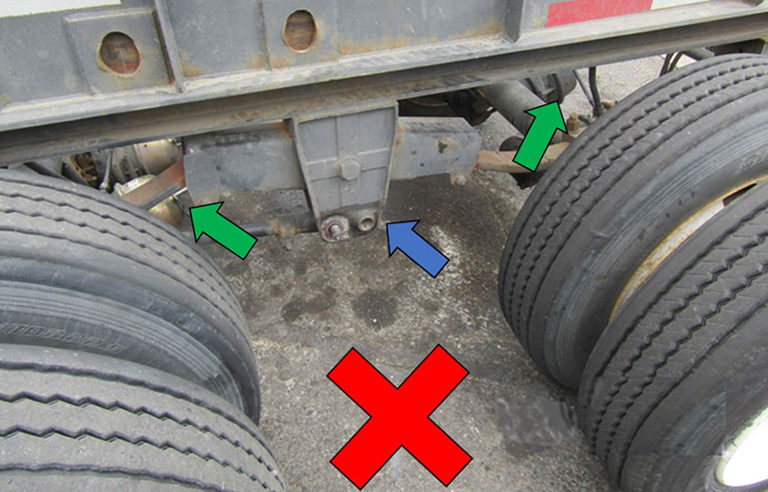
X shows where the 62-year-old mechanic was trapped and crushed by the rollaway chassis’ wheels. Green arrows show airbrake chambers and air supply lines. Blue arrow shows leaf spring/torque arm hanger where repair was being made. Photo: Washington State Fatality Assessment and Control Evaluation Program
Tumwater, WA — Spurred by separate rollaway incidents in which truck mechanics were killed, Washington state has published a hazard alert.
Issued by the Washington State Fatality Assessment and Control Evaluation Program, the alert details the incidents. The mechanics, ages 47 and 62, were crushed while welding the rear of a container chassis and repairing the suspension on a container chassis, respectively. Neither truck had its parking brakes set or wheels chocked.
Bureau of Labor Statistics data shows that 472 bus and truck mechanics and diesel engine specialists died on the job between 2003 and 2020. Struck-by incidents, including rollaways, were the most common cause of these fatalities. Tips for employers and mechanics include: Install electronic parking brake systems and driver warning alarms: The former of these can set a parking brake automatically if a driver doesn’t, while the latter alerts drivers to when a parking brake isn’t set. Both can be combined with fleet telematics to inform managers of rollaways or close calls. Create and enforce a standard operating procedure policy for parking brake and wheel chock use: The SOP should be used to require all vehicle operators, including truck drivers and mechanics, to set a parking brake whether they leave or stay inside the cab, as well as turn the truck’s front wheels to the curb or side of the road – and chock at least one rear wheel – when parked on a slope. Post high-visibility warning signs: These signs should be in maintenance shops, terminal yards and loading docks to remind vehicle operators to shut off the engine, set the parking brake and chock rear wheels before exiting a truck. Operators should follow parking brake and wheel chocking requirements during maintenance, loading and unloading, and use truck and trailer restraints and dock locks, if available.
McCraren Compliance can help you understand and comply with FMCSA, USDOT and ADOT and ensure your drivers and your vehicles operate safely and efficiently.
Call us Today at 888-758-4757 or email us at info@mccrarencompliance.com to schedule your free FMCSA Compliance Assessment.
Original article published by Safety+Health an NSC publication


